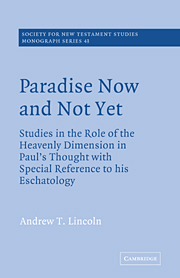 Paradise Now and Not Yet
Paradise Now and Not Yet Book contents
- Frontmatter
- Contents
- Preface
- Abbreviations and note on the text
- Introduction
- 1 Galatians and the heavenly Jerusalem
- 2 1 Corinthians and heavenly existence
- 3 2 Corinthians, the heavenly house and the third heaven
- 4 Philippians and the heavenly commonwealth
- 5 Colossians and heavenly-mindedness
- 6 Ephesians and heavenly life in the Church at worship
- 7 Heaven and the eschatological perspective in Pauline thought
- Notes
- Bibliography
- Index
2 - 1 Corinthians and heavenly existence
Published online by Cambridge University Press: 03 November 2009
- Frontmatter
- Contents
- Preface
- Abbreviations and note on the text
- Introduction
- 1 Galatians and the heavenly Jerusalem
- 2 1 Corinthians and heavenly existence
- 3 2 Corinthians, the heavenly house and the third heaven
- 4 Philippians and the heavenly commonwealth
- 5 Colossians and heavenly-mindedness
- 6 Ephesians and heavenly life in the Church at worship
- 7 Heaven and the eschatological perspective in Pauline thought
- Notes
- Bibliography
- Index
Summary
In 1 Corinthians the heavenly dimension becomes explicitly prominent in Paul's discussion at chapter 15 when in verses 42–9 he describes both Christ and believers as heavenly. As he deals in a comprehensive way with the resurrection of the dead, he is able to set out his own perspective on heavenly life and the place of the body in Christian existence, two themes which are central not only to this chapter but also to an understanding of the diverse problems in the church at Corinth and the attitudes which gave rise to these problems.
Heavenly existence in Corinth
It is generally agreed that the irony of the apostle's language in 1 Corinthians 4: 5, 8 reflects the ‘over-realized’ eschatology of many in Corinth. These Corinthians believed that the kingdom was already here and that they as the saints were already reigning and judging. Their life in the Spirit with its abundance of charismatic gifts seemed to them proof that they were already enjoying the eschatological blessings of freedom and fullness associated with the consummation. Some of Paul's attempts to correct this over-confidence can be seen in his emphasis on the suffering involved in his life as an apostle (4: 9f), his use of the race metaphor (9: 24f) and his reminder that the perfect is still future (13: 8–10, 12). The Corinthians, however, interpreted everything from their own perspective.
- Type
- Chapter
- Information
- Paradise Now and Not YetStudies in the Role of the Heavenly Dimension in Paul's Thought with Special Reference to his Eschatology, pp. 33 - 54Publisher: Cambridge University PressPrint publication year: 1981


